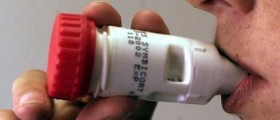
Diazepam, marketed as Valium, is a benzodiazepine drug used in the treatment of anxiety disorders, but it can also be prescribed for insomnia, seizures, muscle spasms, alcohol withdrawal accompanied by hallucinations, agitation and trembling, and other conditions. Pregnant women, people with severe liver disease, sleep apnea, severe breathing problems and those allergic to diazepam, should not use this medication. In cases of drug or alcohol addiction, depression, mental illness, suicidal thoughts, asthma or other breathing problems, seizures, and kidney and liver diseases, the doctor should be notified before they prescribe diazepam, and even then, only the prescribed dosage should be taken, since an overdose might lead to death. Diazepam is known to form addiction, so it should be kept out of reach of people with a history of drug abuse.
As for the side effects, since the drug affects the nervous system, diazepam users may also experience dizziness, headache, vertigo, depression, confusion, fatigue and ataxia, but it can disrupts the cognitive and psychomotor function as well. There have been rare reports of increased agitation and hyperactivity, dystonia (spasms and contractions of muscles) and coma, and if used for a long time, diazepam may induce cognitive and psychomotor impairment. A recent study showed that intravenous administration of diazepam led to local irritation and swelling, venous thrombosis and phlebitis in 8% of patients, while 23% reported a palpable venous cord. The incidence of vascular impairment is low.
Psychiatric side effects are more common in children and the elderly, and they include insomnia, nightmares, rage, irritability, delusions, anxiety, hallucinations, aggressiveness, restlessness, behavioral changes and hyper excited states, which is why people with these symptoms should stop taking the drug. Intravenous use of the drug may cause respiratory arrest, which is why resuscitation equipment should be at hand when administering diazepam in this way. It also makes upper airways refluxes less sensitive raising the concern of aspiration.
As suggested by research, withdrawal syndrome is marked by derealization, depersonalization and distorted perception, but patients on lower doses were found not to experience intense or difficult withdrawal symptoms. Abrupt discontinuation of diazepam can be followed by tremor, panic attacks, insomnia, sweating, depression, anxiety, agitation, convulsion, and abdominal cramping. Sexual dysfunction, incontinence, urinary retention and changes of sexual desires are the reported genitourinary effects, while itching; rashes and severe bronchospasm are rare hypersensitivity side effects. Patients with the liver condition should be monitored during diazepam therapy, since granulomatous hepatitis has been reported as one of the hepatic effects, and rarely elevated liver function tests. Diazepam has been reported to cause hypotension and to reduce myocardial oxygen consumption. Blurred vision or double vision has also been reported, as well as skin reactions. should be at hand when administering diazepam in this way. It also makes upper airways refluxes less sensitive raising the concern of aspiration.

















Your thoughts on this
Loading...